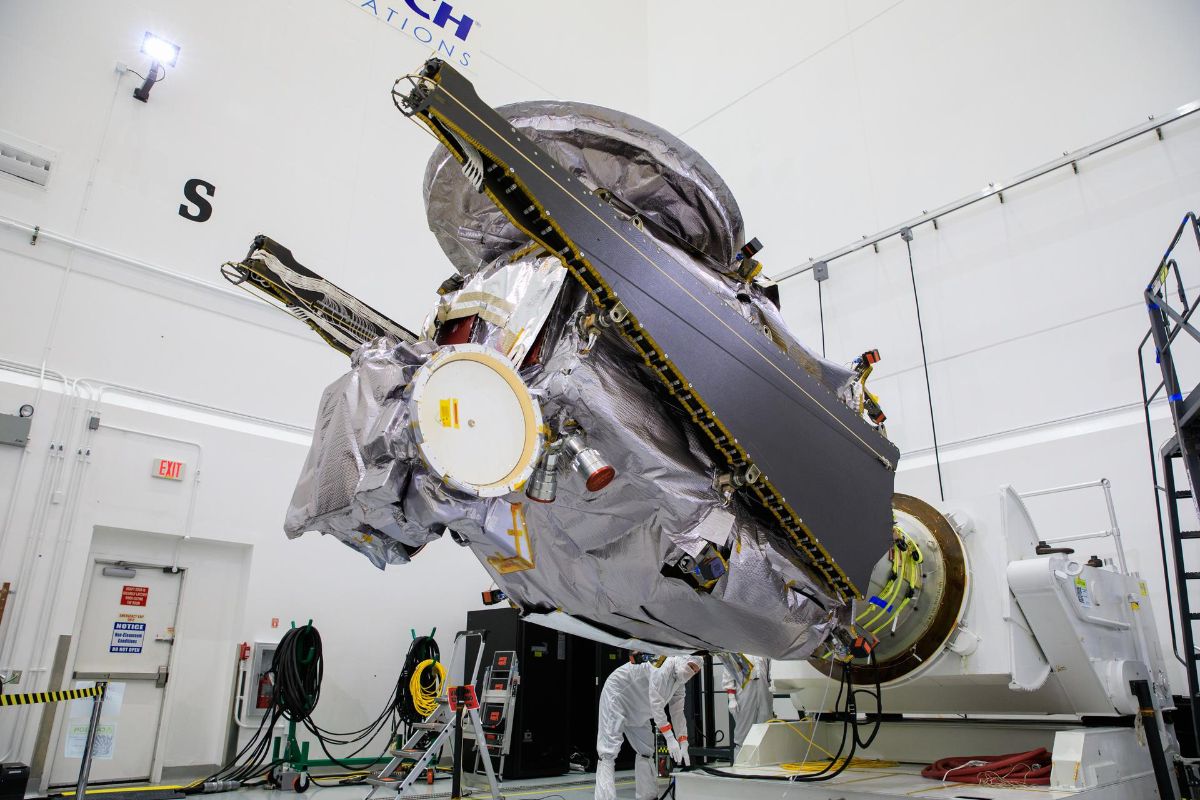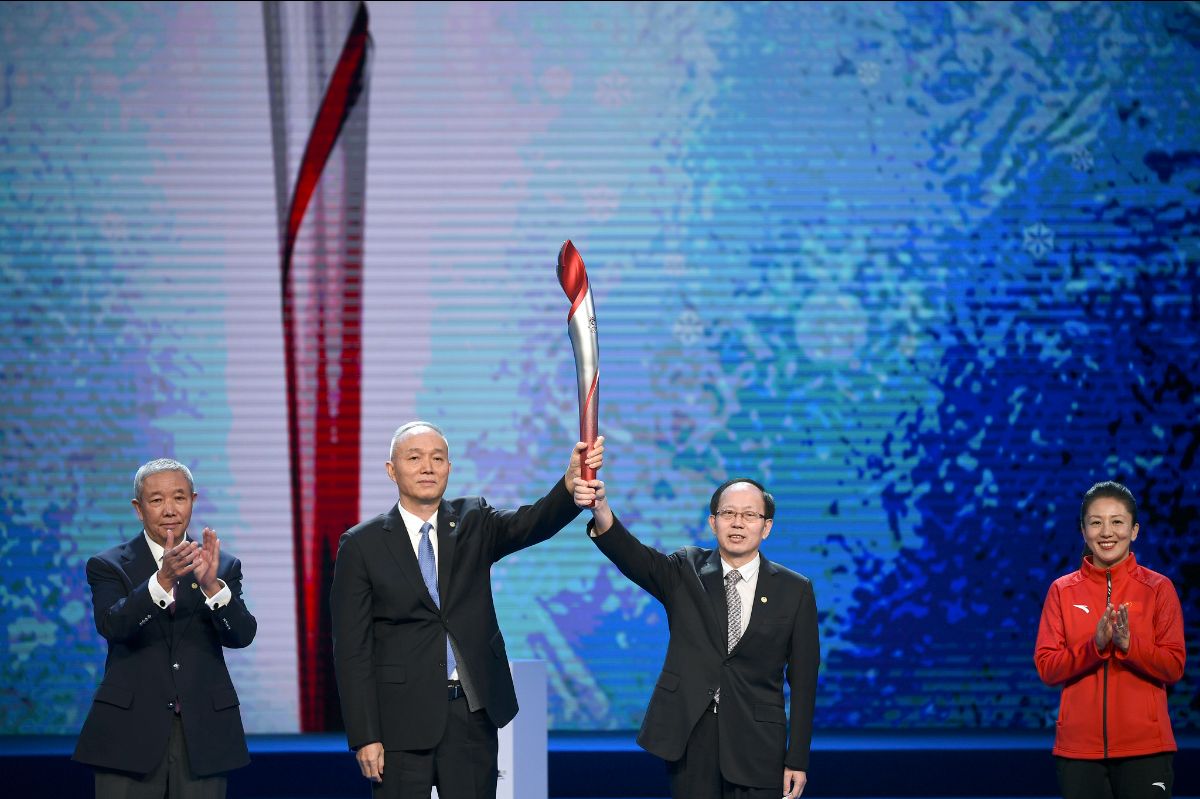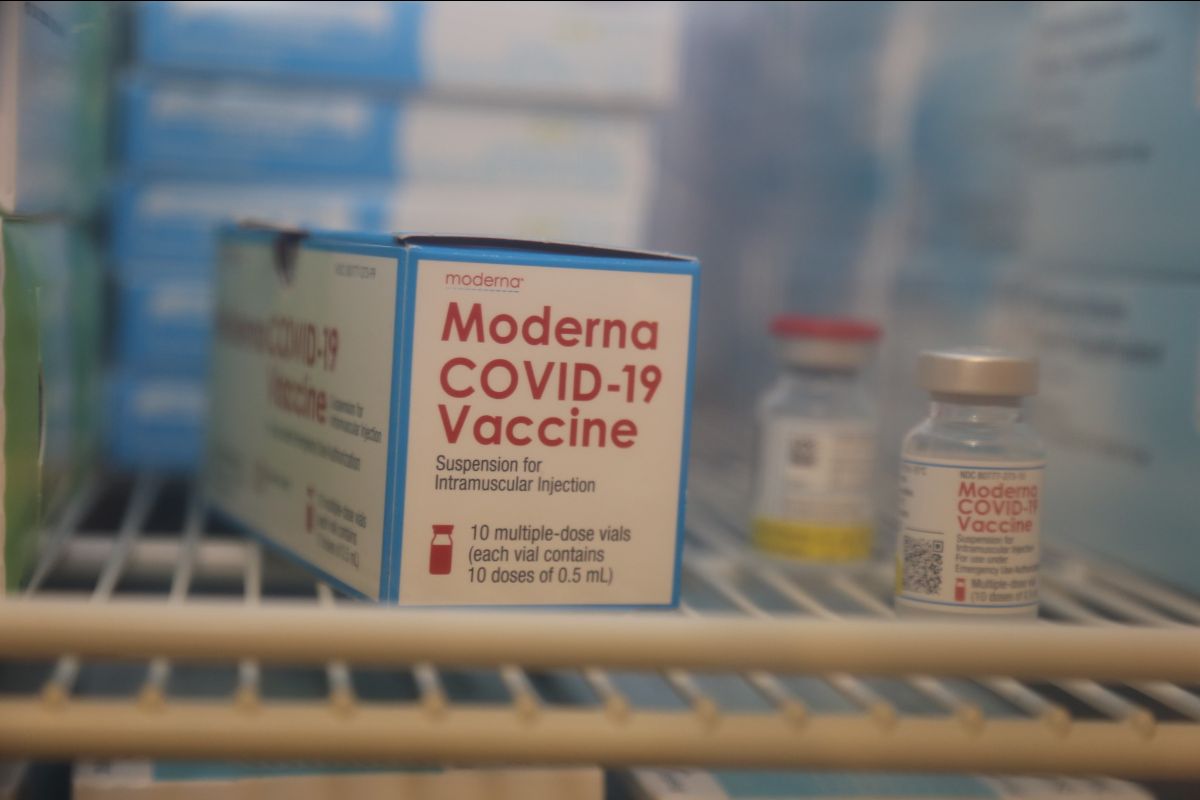Top photo: The U.S. Food and Drug Administration is set to meet Thursday to review safety and efficacy data for booster doses of the Moderna and Johnson & Johnson coronavirus vaccines. (Photo: U.S. Navy / Elaine Heirigs)
Welcome to Factal Forecast, a look at the week’s biggest stories and what they mean from the editors at Factal. We publish our forward-looking note each Thursday to help you get a jump-start on the week ahead. If you like what you see, you can subscribe for free.
A look ahead:
Oct. 15/ FDA discusses coronavirus vaccine boosters: The U.S. Food and Drug Administration’s Vaccines and Related Biological Products Advisory Committee will meet Thursday to review safety and efficacy data for potential booster doses of the Moderna coronavirus vaccine. The panel will reconvene the next day for similar discussions regarding the Johnson & Johnson shot.
- What’s happened so far: The expert committee voted last month to recommend Pfizer booster doses six months after their last shot to people 65 and older and those considered at “high risk” of severe illness, but cited a lack of safety and efficacy data in opting not to expand their guidance to younger groups. Ultimately, the FDA chose to include people under the age of 65 whose “frequent institutional or occupational exposure” puts them at high-risk of complications or serious illness, including teachers, manufacturing workers and public transit staffers. Both Moderna and Johnson & Johnson released data in recent weeks claiming booster doses of their vaccines help maintain a high-level of protection against the virus.
- The impact: In addition to the initial scope of potential boosters, the committee will also evaluate whether a third Moderna dose should contain just half of the original dose, what the best timing of a second J&J shot would be, and the possibility of administering different booster doses than what recipients initially received.
Oct. 15/ France implements coronavirus test fee: Unvaccinated French citizens will no longer be able to get free coronavirus tests starting Friday as Paris’ attempts to encourage the population to get vaccinated escalate. Tests for vaccinated citizens will remain free.
- What’s happened so far: The announcement follows this summer’s vaccine pass rollout, which prompted large protests from those opposed to providing proof of vaccination or a negative test to enter restaurants, bars, gyms and other indoor venues. Now, with unvaccinated individuals paying for tests, entry into these venues will require a de-facto fee, with each test costing between $25 and $50.
- The impact: The additional burden risks reigniting tensions among protesters opposed to the measures. France, despite being infamously skeptical of vaccines, has one of Europe’s highest rates of inoculation, with nearly 70 percent of the population fully vaccinated. This signals that despite the visible opposition to President Emmanuel Macron’s policies, they are potentially helping drive France’s relative vaccine success.

Oct. 16/ NASA’s Lucy Mission launches: NASA is scheduled to launch the Lucy spacecraft as early as Saturday for the first mission to the Trojan Asteroids in Jupiter’s orbit.
- What’s happened so far: According to NASA, the unmanned mission will include a journey to eight different asteroids. Over the 12-year journey, Lucy will make three-and-a-half loops around the Sun, traveling almost four billion miles in the process. The mission takes its name from “Lucy”, the iconic partial skeleton of a 3.2 million-year-old human ancestor discovered in Ethiopia in 1974 that expanded researchers’ understanding of human evolution.
- The impact: The asteroids Lucy will travel to are believed to be remnants of the primordial material that formed the outer planets, making them effectively fossils of planet formation. Similarly to how Lucy’s fossilized skeleton helped scientists understand human evolution, researchers hope NASA’s Lucy will improve understanding of our solar system’s evolution.
Oct. 18/ Robert Durst sentencing hearing: New York real estate heir Robert Durst is expected to be sentenced to life without parole Monday after being found guilty in September of the 2000 murder of Susan Berman.
- What happened so far: Durst spent decades as a murder suspect after his first wife Kathie disappeared in 1982, and was found guilty of the murder of Susan Berman following only eight hours of jury deliberation that capped a made-for-TV trial. The jury accepted a special-circumstance allegation after prosecutors argued Durst killed Berman to prevent her from talking to police about the disappearance of his wife. Durst came to national attention again recently during an HBO documentary in which he appeared to confess to the killings of Susan Berman, Kathie Durst and his Galveston, Texas, neighbor Morris Black.
- The impact: Durst will likely spend the rest of his life behind bars, but, given he age, some may feel like justice came too late. Meanwhile, the Westchester, N.Y., district attorney appears likely to impanel a grand jury to further investigate the death of Kathie Durst, creating the possibility of a new trial, which some say could implicate other members of the Durst family.
Oct. 18/ Winter Olympics torch relay begins: The torch lighting ceremony for the upcoming Beijing 2022 Winter Olympics will be held without spectators on Monday in Olympia, Greece — the second ceremonial beginning for the Olympics held during the coronavirus pandemic.
- What’s happened so far: The Tokyo Summer Olympics finished two months ago after a year of pandemic-induced delays, leaving just six months in between the two sets of Olympic Games instead of the usual two years. The International Olympic Committee recently announced new measures against coronavirus for the Beijing Olympics that are even stricter than those applied to Tokyo.
- The impact: The coronavirus pandemic continues to restrict Olympic tradition, with no torch relay in Greece planned and no fans present for the brief ceremony where the flame will be handed off to Chinese organizers in Athens a day after the lighting ceremony. China, however, is set to allow mainland residents to attend the games, provided they meet the requirements set by organizers.

(Photo: International Olympic Committee)
Oct. 19/ NBA regular season begins: The NBA season kicks off Tuesday with questions about the vaccination status of one of its star players.
- What’s happened so far: This is the first time since 2019 the league will play its normal schedule. In 2020, the league suspended its regular season on March 11 after Utah Jazz player Rudy Gobert tested positive shortly before a game. It restarted the season in July in a bubble. No one tested positive during that three-month period, but the extended season also meant pushing last year’s start to December with each team playing 10 fewer games than normal.
- The impact: Several cities recently passed laws that mandate vaccination for anyone entering certain buildings or attending large-scale events. That could prevent some players from being able to suit up. Most notably, Brooklyn Nets star Kyrie Irving is not eligible to play in the team’s 41 home games at Barclays Center or two games at Madison Square Garden. Instead of allowing him to play in road games, the Nets announced Tuesday that Irving won’t be allowed to play or practice until he can be a “full participant.” Irving also will be fined if he can’t play because of vaccine mandates, which could cost him roughly $380,000 per game.
Oct. 20/ Russia invites Taliban to Afghanistan talks: Russia will invite Taliban representatives to talks on Afghanistan in Moscow on Wednesday, according to Russia’s envoy to Afghanistan. The group has been formally banned in Russia since 2003.
- What’s happened so far: The upcoming conference follows a G20 summit on Oct. 12 that sought to help Afghanistan avoid a humanitarian crisis in the wake of the Taliban’s takeover that coincided with United States’ troop withdrawal. Following the offensive, Russia said it wouldn’t evacuate its embassy in Kabul, unlike many other countries. Its ambassador also quickly met with the Taliban for “constructive” talks. Since 2018, Russia has hosted Taliban delegations for several meetings attempting to mediate peace with the former Afghan government.
- The impact: The exact nature of the upcoming talks and makeup of the delegation remains unclear. While Russia stopped short of recognizing the Taliban as a legitimate government, observers noted an apparent softening in rhetoric toward the group. Meanwhile, wary of security impacts to the wider Central Asian region with Taliban in power, Russia’s military has carried out several exercises at its bases in Tajikistan and Uzbekistan, which border Afghanistan.
Oct. 21/ Serbia-Kosovo talks in Brussels: Representatives for Pristina and Belgrade will begin another round of talks Thursday in the wake of border escalations provoked by disputes over the national registration of car plates.
- What’s happened so far: The EU special representative for Belgrade-Pristina talks announced last month that both parties agreed to remove special police deployed at the border in Jarinje, Kosovo, and Brnjak, Serbia, and establish a working group to discuss license plate issues. This came after ethnic Serbs allegedly set fire to government offices in Kosovo following a new ruling which forced Serbian drivers to change their car plates when crossing the border. Kosovo reportedly introduced the ruling in response to a similar rule Serbia put in place in 2008. Both countries have agreed to place special stickers on car license plates to hide national symbols as a temporary solution.
- The impact: The working group, which will be chaired by the EU, has six months to come up with a permanent solution to the issue. The outcome of the talks is important because normalization of relations between Serbia and Kosovo has been a condition for their membership into the EU. But a division among the bloc’s member countries over the Balkan states’ potential membership could hinder incentives to come to an agreement.
Oct. 21/ European Council meeting: European leaders will meet Thursday in Brussels to discuss several pertinent issues, including the energy crisis and migration concerns.
- What’s happened so far: The European Council has a long list of topics to discuss when leaders meet in Brussels next week for a two-day summit after more than a year and half of a global pandemic during which many meetings were postponed or held virtually. The agenda ranges from talks around coronavirus vaccination efforts to digital transformation, energy prices, migration and trade.
- The impact: With several European countries struggling with soaring energy prices, leaders hope to develop concrete solutions at the meeting. Spanish officials called for a discussion about the causes of the price surge and ways to improve the EU’s regulatory framework for setting energy prices. The union’s gas storage sites last week were filled to just 75.7 percent of capacity, compared with 95.2 percent a year ago, with benchmark European gas prices rising more than 300 percent this year. Leaders are also expected to discuss preparations for crucial upcoming summits, including the ASEM summit which will be held virtually and the COP26 on climate change in Glasgow, Scotland.
What else matters:
Lebanon energy crisis: Lebanon, a nation of more than 7 million, slumped deeper into chaos last week after its two main power plants ran out of fuel, causing a nationwide outage. Already one of the world’s most indebted countries, Lebanon is struggling to contain economic and political crises while its people remain trapped on the front lines of a regional proxy war between Saudi Arabia and Iran.
- Watch for: Though power was restored after approximately 24 hours, it took army intervention with its own fuel reserves to restore “normal” electricity supplies of only a few hours per day. A month after billionaire Najib Mikati took office as prime minister, ending a year-long vacancy, the country has made little tangible progress to address the crises it faces on multiple fronts. The government said it’s communicating with the International Monetary Fund to secure a rescue package, though the timing of formal discussions and size of the loan remain unclear.
Kenya-Somalia maritime border ruling: The International Court of Justice ruled Tuesday largely in favor of Somalia following a protracted dispute with Kenya over a triangle of the Indian Ocean believed to be rich in oil and natural gas deposits. In a lengthy judgement, the court proposed a new boundary dividing the disputed area in two, but rejected Somalia’s assertion that Kenya had violated its sovereignty and therefore owed reparations. The two nations had attempted to resolve the dispute through diplomatic talks in 2014, but these were unsuccessful, leading Somalia to file the case. Somali President Mohamed Abdullahi Farmaajo hailed Tuesday’s ruling as a “historic victory,” but Kenya’s President Uhuru Kenyatta rejected the ruling. saying his country does not recognize the court’s jurisdiction.
- Watch for: As Kenya has dismissed the ruling, the dispute could now be referred to the UN Security Council, as the ICJ does not have powers to enforce its judgement. The ruling is likely to worsen relations between the two nations, which have deteriorated over the past two years due to a series of spats over diplomacy, security and trade. Clashes at sea are also possible if both nations deploy their respective security forces to enforce their ownership of the maritime territory.
Extended outlook: What’s on our radar in the coming weeks
Oct. 14: Giulio Regeni murder trial in Italy; New Japanese PM expected to dissolve parliament; Indonesia reopens Bali for some tourists
Oct. 15: FDA discusses Johnson & Johnson booster; France implements coronavirus test fee
Oct. 16: NASA’s Lucy Mission launches
Oct. 17: Cape Verde presidential elections; T20 Cricket World Cup begins
Oct. 18: Robert Durst sentencing hearing; 2022 Winter Olympics torch relay begins
Oct. 19: NBA regular season begins
Oct. 20: Russia invites Taliban to Afghanistan talks
Oct. 21: Serbia-Kosovo talks in Brussels; European Council meeting
Oct. 23: Rugby League World Cup in England
Oct. 24: Uzbek presidential election
Oct. 25: Trial of Metropolitan police officer charged with kidnap and murder of Sarah Everard
Oct. 26: ASEAN Summit in Brunei
Oct. 30: G20 summit in Rome
Oct. 31: Planned launch of James Webb Space Telescope
Nov. 1: U.S. to allow fully vaccinated travelers from Canada and Mexico; South Africa local government elections; UN Climate Change Conference
Nov. 2: Virginia and New Jersey gubernatorial and Ohio congressional special elections
Nov. 5: China International Import Expo in Shanghai
Nov. 7: Nicaraguan general election; Daylight saving time ends in most of Canada and the U.S.

